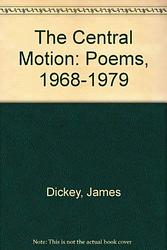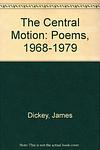The Central Motion by James Dickey
"The Central Motion" is a collection of poems that delves into the human experience through a blend of raw emotion and vivid imagery. The work explores themes of nature, mortality, and the essence of movement, both physical and metaphysical. The poet employs a unique voice to examine the interconnectedness of life, the tension between the individual and the collective, and the perpetual cycle of death and rebirth. With a keen eye for detail and a profound understanding of the human condition, the poems invite readers to contemplate the central motion that drives all existence.
The 8310th greatest book of all time
Ranking Details:
Our ranking system awards points to books based on their appearance and position on curated lists. Here's how it works:
Unranked Lists: For lists without specific rankings, each book receives points equivalent to the list's weight. This approach recognizes the book's inclusion on prestigious lists.
Ranked Lists: Books on ranked lists receive points in two ways:
- Base Points: Initially, every book is awarded points equal to the list's weight, acknowledging its significance.
- Bonus Points: Additionally, books earn bonus points based on their ranking. The total bonus pool, equal to 100% of the list's weight, is distributed among the books, with higher-ranked books receiving more points.
Exponential Distribution: The distribution of bonus points follows an exponential model. This means the top-ranked book (#1) receives significantly more bonus points than those further down the list (e.g., #100). Our algorithm ensures that higher placements are rewarded more generously, reflecting the achievement of a top rank on any given list.
This scoring system ensures that each book's ranking reflects both its presence on multiple lists and its positions within those lists, providing a comprehensive measure of its acclaim and popularity.
Total Points: 45
Since this book was first published in 1983, there is a penalty of 14.4%. The age adjusted score is 38.52.
This is to prevent newer books from reaching super high on the ranked list of the greatest books of all time. The greatest books should also stand the test of time.
- score: 45 -- Harold Bloom's The Western Canon (Weight: 45)

